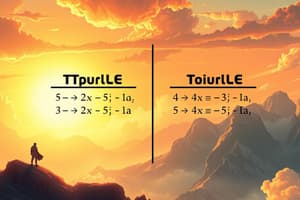Podcast
Questions and Answers
Explain the concept of implication in logic.
Explain the concept of implication in logic.
Implication in logic signifies a relationship between two premises where one follows from another. For example, 'if it rains today, I will take my umbrella out.'
What is the Modus Ponens rule in logic?
What is the Modus Ponens rule in logic?
Modus Ponens, also known as the rule of detachment, states that when we have 'p → q' and 'p', we can conclude 'q'.
Why is understanding the directions in logic important?
Why is understanding the directions in logic important?
Understanding the directions in logic helps us construct valid chains of reasoning and analyze statements effectively.
How does the arrow of entailment relate to implication?
How does the arrow of entailment relate to implication?
Give an example of applying Modus Ponens in a real-life scenario.
Give an example of applying Modus Ponens in a real-life scenario.
How do propositional equivalences aid in analyzing statements and arguments?
How do propositional equivalences aid in analyzing statements and arguments?
What is the double negative elimination principle?
What is the double negative elimination principle?
How can De Morgan's laws simplify logical expressions?
How can De Morgan's laws simplify logical expressions?
Explain the concept of fuzzy logic.
Explain the concept of fuzzy logic.
How do conjunctions and disjunctions differ in logic?
How do conjunctions and disjunctions differ in logic?
Give an example of De Morgan's law applied to negated disjunction.
Give an example of De Morgan's law applied to negated disjunction.
Explain the significance of propositional equivalences in formal logic systems.
Explain the significance of propositional equivalences in formal logic systems.
Flashcards are hidden until you start studying
Study Notes
Logic and Its Equivalence Principles
Logic is often referred to as the art of thinking well, encompassing principles of reasoning and argumentation. In the realm of logic, there exist several propositional equivalences—principles that help us analyze statements and arguments more effectively. These principles aid in recognizing different ways that ideas can be expressed while maintaining their logical integrity. Let's explore some key concepts within this area.
Implication and Modus Ponens
One fundamental principle in logic is implication, which signifies a relationship between two premises where one follows from another. For example, if it rains today, I will take my umbrella out. Here, 'it rains today' implies 'I will take my umbrella out'. This type of proposition has a directional flow called the arrow of entailment; moving forward means something like 'if p, then q', and backward means something like 'q, therefore, p'. Understanding these directions helps us construct valid chains of reasoning.
Modus ponens, known as the rule of detachment, states that when we have 'p → q' ("If A, then B") and "A," then we can conclude "B." It allows us to deduce new information from existing knowledge by following the rules of transition, such as if rain exists, then people carry umbrellas. Therefore, upon observing that it's raining today, we know that most likely others would also bring their umbrellas with them.
Negation and Double Negation Elimination
The negation operator is used to express logical contradictions or opposites. For instance, 'Not p,' where p represents any statement, indicates its opposite meaning. However, the double negative elimination principle suggests that expressions like "It's not true that it's not raining" cannot be used because they lead you back into what was initially rejected - hence the name, double negative elimination.
In terms of everyday life applications, consider a situation where someone says, "John never goes shopping," and later he does go shopping. We can infer that his initial claim wasn't accurate, and using the principles of negation and double negative elimination, we understand how our interpretation changes based upon subsequent evidence.
Conjunction and Disjunction
Conjunctions combine multiple propositions together with an AND operation, whereas disjunctions link them through an OR operation. Consider the sentence, "Either John went shopping or he didn't," where we don't have enough information yet. If we find out that neither statement holds true, then this leaves us without sufficient data to make any conclusion. On the other hand, if only one of them applies, say John did indeed go shopping, then we could draw conclusions accordingly. These operations allow us to build complex relationships among various pieces of information.
De Morgan's Laws
De Morgan's laws relate to these conjunctive and disjunctive forms, providing rules for transforming compound statements involving both operations. They state that (A ∧ B)' = ~A ∨ ~B (negated conjunction) and (A ∨ B)' =~A ∧ ~B (negated disjunction), respectively. These laws enable us to simplify certain types of logical expressions.
Fuzzy Logic
Fuzzy logic extends classical logic by allowing degrees of truth rather than just 'true' or 'false.' It deals with vague or uncertain information that may fall somewhere between black and white instead of being confined strictly to either category. This formulation helps capture nuances often encountered in natural language processing or decision making under uncertainty.
These propositional equivalences serve as cornerstones in understanding formal logic systems, guiding human thought processes and influencing fields ranging from philosophy to computer science. As we delve deeper into logic, we uncover further intricate structures beneath every apparent simplicity, rendering complexity manageable.
Studying That Suits You
Use AI to generate personalized quizzes and flashcards to suit your learning preferences.



